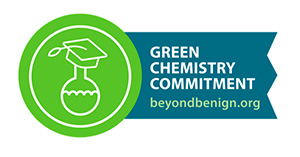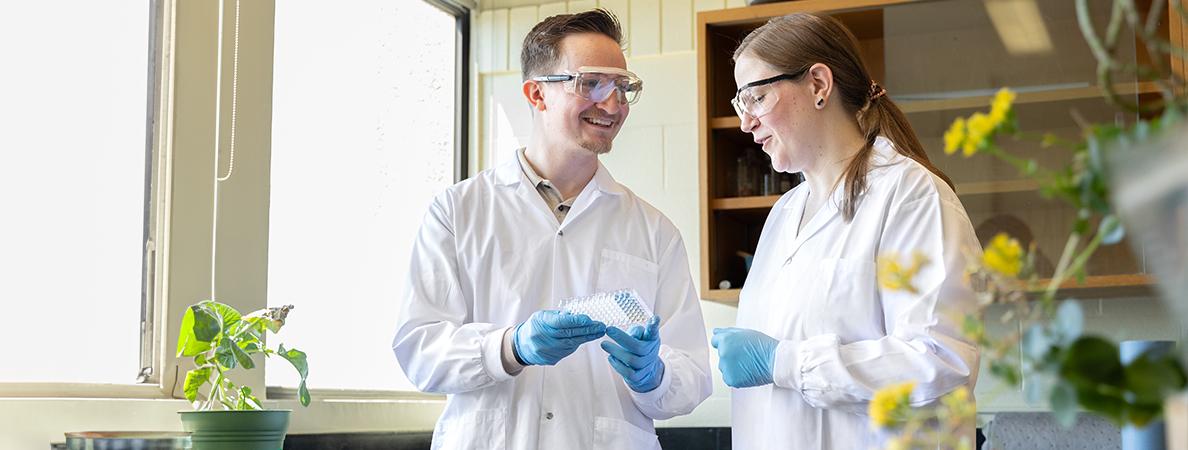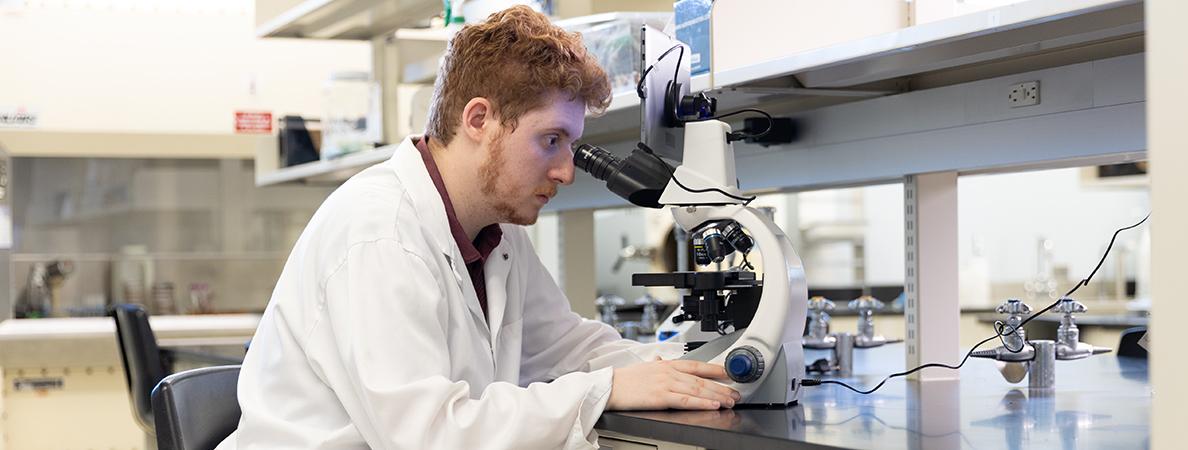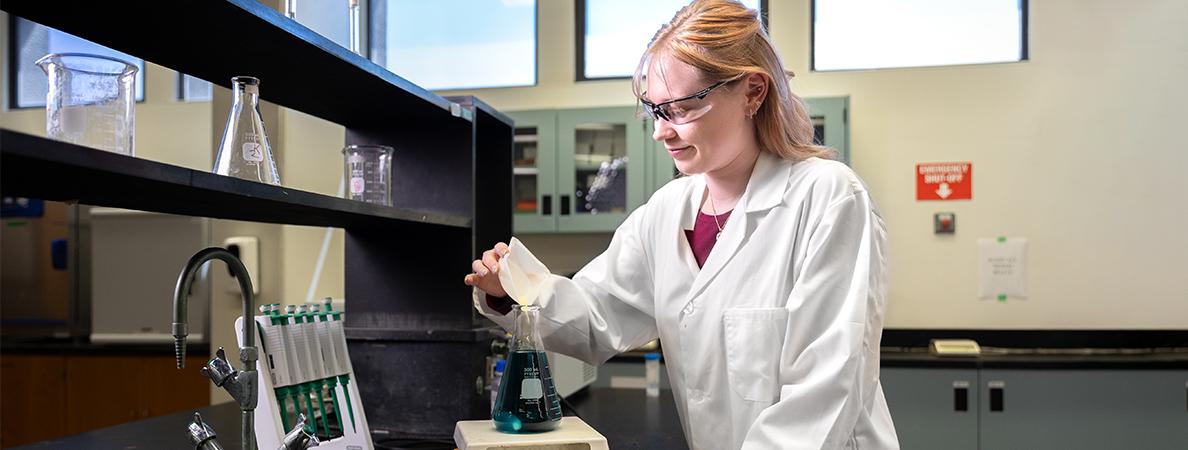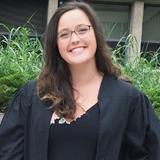Biotechnology - Advanced
671
Program Highlights
- Elite program at the technologist level provides sought-after lab skills and training in cutting-edge trends in the biotechnology field.
- Graduates have enhanced opportunities for biotechnology careers and pathways to university.
- Opportunity to take part in sustainable practices in labs.
- This program is engaged and committed to including Indigenous content and knowledge in courses.
What you'll learn
- Fundamentals of applied molecular biology, genetics, biochemistry, microbiology, pharmacology, analytical instrumentation and bioengineering.
- Investigate the advanced topics of clinical trials, drug discovery, cell culture, environmental biology and laboratory management.

Start with a diploma, Finish with a degree.
Explore Mohawk College’s Biotechnology pathway program to earn a Bachelor of Technology (B. Tech)
Program Length
3 academic years (periods of 8 months), plus co-op
Course Overview & Descriptions
Click on the course title for a course description.
Learning Outcomes
Program Learning Outcomes, often referred to as ‘Program Standards', set out the essential learning that a student must achieve before being deemed ready to graduate.
In many cases these program learning outcomes were developed by the Ministry of Colleges and Universities (MCU) in consultation with employers and educators who are experts in the program field. To ensure the outcomes remain current and in line with industry needs, we invite our employers, graduates working in the field and current students to re-examine and update them during regular, ongoing program review focus groups.
Admission
- OSSD or equivalent (Mohawk Academic Upgrading, GED) including:
- Grade 12 English, C or U or equivalent
- Grade 12 Mathematics; MAP4C ≥ 60% or MCT4C; or any U or equivalent*
- Senior Science (Chemistry or Biology) is recommended
- Options are available for mature applicants
Don't have the necessary requirements?
Applicants whose first language is not English will be required to demonstrate proficiency in English.
Language Requirements for Applicants with English as a Second Language
- See below for accepted equivalents for Grade 12 English:
- Successful completion of the GAS-English for Academic Purposes (478) program
- TOEFL minimum score of 550 (80 Internet based)
- or IELTS Academic minimum score of 6.0 overall with no band less than 5.5
- More information about acceptable certificates, can be found on the International Admission Requirements
Tuition and Fees
2025 - 2026 Domestic Tuition and Fees
| Description | Semester 1 | Semester 2 |
|---|---|---|
| Compulsory Ancillary Fees | $907.11 | $809.78 |
| Co-op Fees | $333.59 | $297.33 |
| Compulsory Program Fees | $0.00 | $0.00 |
| Domestic Tuition | $1,948.31 | $1,948.31 |
| Total Domestic Charges Per Semester | $3,189.01 | $3,055.42 |
| Total 1st Year Fees | $8,887.05 | |
Above fees based on full-time September program start date. Contact Student Services to confirm fees for other start dates or semesters.
- Full Cost Breakdown
- Explore payment options
- Book costs for your program can be found through the Campus Store
2025 - 2026 International Tuition and Fees
| Description | Semester 1 | Semester 2 |
|---|---|---|
| Total Tuition & Ancillary Fee | $9,435.00 | $9,435.00 |
| Co-op Fees | $333.59 | $297.33 |
| Program Compulsory Fees | $0.00 | $0.00 |
| International Tax Recovery | $450.00 | $375.00 |
| Total International Per Semester | $10,218.59 | $10,107.33 |
| Total 1st Year Fees | $20,325.92 | |
If you pay by wire transfer, please note your bank might charge you a fee to transfer money. Make sure your transfer includes the Mohawk payment and the wire transfer fee. This applies to each wire transfer payment you make.
Financial Assistance
When it comes to paying for your education, investing in your future can be more affordable than you think. A Mohawk education is one of the most cost-effective means of acquiring the skills and knowledge you need to have a prosperous and rewarding career.
As you start on your chosen career path, it's important to have a realistic set of expectations regarding the expenses associated with attending college. In addition to your tuition fees, you will also need to budget for books, supplies, housing, and other related living expenses. You may be able to supplement your income and savings with scholarships, bursaries, or loans. It pays to do some research into what types of financial assistance you may qualify for.
Available Financial Assistance Resources:
 OSAP Eligible. Learn about Ontario Student Assistance Program - OSAP (domestic students only)
OSAP Eligible. Learn about Ontario Student Assistance Program - OSAP (domestic students only)- Working on Campus
- Additional Sources of Funding
- Financial Assistance Home Page
Apply for Awards:
By submitting a Scholarships and Bursaries Application every semester, students have access to over $3 million in Mohawk College scholarships, bursaries and Ministry-partnered funding to help meet their financial needs.
Financial Literacy:
Whether saving for school, sticking to a budget, or planning for a major purchase, financial literacy affects us all. That's why Mohawk College is dedicated to helping students improve their financial literacy and become more confident in managing their money.
- Complete the free online Money Matters Module to earn Co-Curricular Credit!
- Financial Resources and Calculators
Experiential Learning
How you’ll gain skills
- Receive classroom instruction combined with hands-on laboratory experience to perform and coordinate tasks in the following areas:
- DNA analysis including electrophoresis, cloning and PCR (polymerase chain reaction)
- Protein analysis including electrophoresis and chromatography
- DNA and protein absorption spectrophotometry
- Basic and Advanced techniques in microbiology
- Cell Biology and Cell Culture
- Food safety
- Immunology and Virology
- Bioengineering
- Instrumentation
- Gain valuable experience during co-op work terms.
To learn more, please visit the Centre for Experiential Learning.
Co-op Format (Fall Intake)
| September to December | January to April | May to August |
|---|---|---|
| Semester 1 | Semester 2 | Vacation |
| Semester 3 | Semester 4 | Work Term 1 (Co-op) |
| Semester 5 | Work Term 2 (Co-op) | Work Term 3 (Co-op) |
| Work Term 4 (Co-op) | Semester 6 |
Co-op Format (Winter Intake)
| January to April | May to August | September to December |
|---|---|---|
| Semester 1 | Semester 2 | Semester 3 |
| Semester 4 | Work Term 1 (Co-op) | Semester 5 |
| Work Term 2 (Co-op | Work Term 3 (Co-op) | Work Term 4 (Co-op) |
| Semester 6 |
Co-op Delivery and Fees
This program has a mandatory co-op, as part of the program of study. The annual co-op fee structure can be found on the Tuition and Fees page.
For questions, please contact the Co-op Specialist listed at the bottom of the webpage.
Driver's License and Vehicle
Please note that the majority of co-op positions for this program require that students have a valid driver's license ('G' class preferred) and access to a vehicle.
Co-op Designation
This program offers four co-op work term opportunities but requires two completed co-op work terms for the co-op designation.
Work Term Capabilities
(which do not reflect individual's personal work experience)
Classroom instruction, combined with hands-on laboratory experience, have provided the student with sufficient knowledge to perform tasks in the following areas:
- Micropipetting, extractions, titrations, centrifugation and pH measurements using Good Lab Practices (GLP)
- DNA analysis (DNA quantification, agarose gel electrophoresis, use of gel documentation equipment/software, transformations, cloning, PCR, qPCR)
- Protein Analysis (protein quantification, SDS PAGE, Western blotting, chromatography)
- Techniques in general, food, and pharmaceutical microbiology
- Techniques in plant and animal cell culture (biosafety cabinet use)
- Bioreactor/Fermentation Technology
- Pharmaceutical Quality Guidelines (GLPs, GMPs, ICH, USP)
- SOPs, Good Documentation Practices
- HPLC, GC-MS
- Quality control
- Aseptic Techniques
| Co-op Pay Range | Co-op Pay Average |
|---|---|
| Range: $17.60 - $28.00 | Average: $20.00 |
For further information, please contact:
Blair Goodman, Co-op Specialist
Phone: 905-575-2168
Email: blair.goodman [at] mohawkcollege.ca (Blair Goodman)
Educational Pathways
Pathways to Mohawk
If you've successfully taken a course at another post-secondary institution, you may be able to earn course exemptions toward your credential here at Mohawk.
If you have successfully completed one of the following programs at Mohawk, you may be eligible to receive transfer credit in this program. To start a new program at Mohawk, you must apply via ontariocolleges.ca.
Transfer from
You can transfer to the Biotechnology - Advanced - 671 from the following programs:
Biotechnology
Receiving Program
Biotechnology - Advanced
Transfer to
You can transfer from the Biotechnology - Advanced - 671 to the following programs:
Biotechnology - Advanced
Digital Health
Credit transfer agreements have been arranged to make it easier for students to move from Mohawk to another institution.
Transfer From Biotechnology - Advanced To
McMaster University
1280 Main Street West
Hamilton ON L8S 4L8
Canada
Bachelor of Technology - Biotechnology Combined Degree/Diploma Program
1280 Main Street West
Hamilton ON L8S 4L8
Canada
University of Guelph-Humber
207 Humber College Blvd
Etobicoke ON M9W 5L7
Canada
Bachelor of Science, with choice of one of four majors:
- Bachelor of Science in Biochemistry
- Bachelor of Science in Biological Science
- Bachelor of Science in Microbiology
- Bachelor Science in Molecular Biology and Genetics
207 Humber College Blvd
Etobicoke ON M9W 5L7
Canada
Fanshawe College
1001 Fanshawe College Blvd
London ON N5Y 5R6
Canada
Honours Bachelor of Applied Technology - Biotechnology (Degree)
1001 Fanshawe College Blvd
London ON N5Y 5R6
Canada
Athabasca University
1 University Dr
Athabasca AB T9S 3A3
Canada
Bachelor of Science - PD
Bachelor of Science - PD with Majors:
- Applied Mathematics
- Computing Information Systems
- Human Science
1 University Dr
Athabasca AB T9S 3A3
Canada
Mohawk College makes every effort to ensure the accuracy of each transfer opportunity. Please note that changes may occur in program offerings, admission requirements, and transfer credits granted by the receiving institutions. We advise all students to check with the receiving institution directly for the most up-to-date information.
Don’t see what you’re looking for? Search ONTransfer.ca for more pathways with Ontario public colleges and universities.
Mohawk College makes no warranty or endorsement of material contained within links to external websites, nor does the College assume any responsibility for the linked website or its contents.
Tech requirements
Computer capable of running Microsoft Office 365, good internet access.
Career Opportunities
Your future career options
- Biotech Laboratory Technologist
- Biotech Production and Technical Sales Representative
- Production Management
- Quality Control
- Water Treatment
- Bioremediation
- Biotech Research
Where you could work includes:
- Food and Agriculture
- Biotechnology Research
- Pharmaceutical and Biologic Production
- Bioscience Laboratories (Public & Private)
- Water/Waste Water Facilities
- Bioremediation Companies
- Biofuel Companies
Opportunities for grads
- Graduates may be eligible to be registered as associate members of The Ontario Association of Certified Engineering Technicians and Technologists (OACETT).
Meet our faculty
Ready to apply?
If you are a Domestic or Canadian applicant, you can apply through the Ontario College Application System.
You are considered a Domestic applicant if you are a Canadian citizen or a permanent resident that resides inside or outside of Canada.
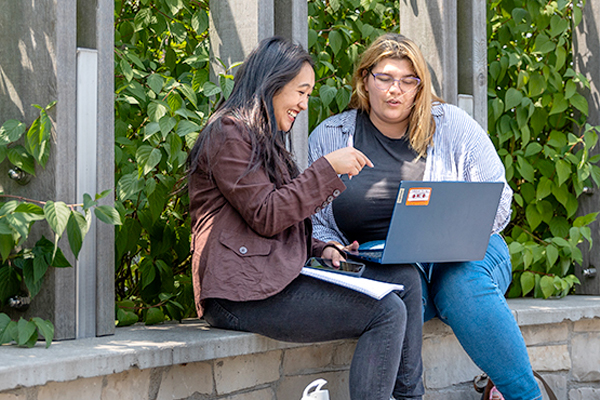
Contact us
Domestic Canadian Students
Contact Student Recruitment
Haven’t applied yet and have questions?
Contact our Student Recruitment team for information on programs, how to apply, and more.
Contact Admissions
Contact our Admissions advisors for help with your application.
Email Admissions
Book an Appointment ⤻
Phone: 905-575-1212
International Students
Contact International Student Recruitment
Contact our International Student Recruitment team for information on programs, how to apply, and student life.
Contact International
Email: intl.representatives@mohawkcollege.ca
Phone: 1-905-575-2254
Toll free phone numbers:
For general questions: 1-888-Mohawk9 (1-888-664-2959)
Contact International Admissions
Contact our Admissions advisors for help with your application.
Contact International Admissions
Phone: 1-905-575-2254
*Not all programs are international eligible. Please see our programs available for international students.
Program Coordinator

Tiffany Leighton

Usha Vivegananthan
Accessible Learning Services
Are you a student with a confirmed or suspected disability? Visit our Accessible Learning Services website to discover how we can help you.
Academic Program Coordinator
Usha Vivegananthan
Email: usha.vivegananthan@mohawkcollege.ca
Phone: 905-575-1212 ext. 3123
Discipline: Academic Program Co-ordinator | Bio Chemical Envir Tech



